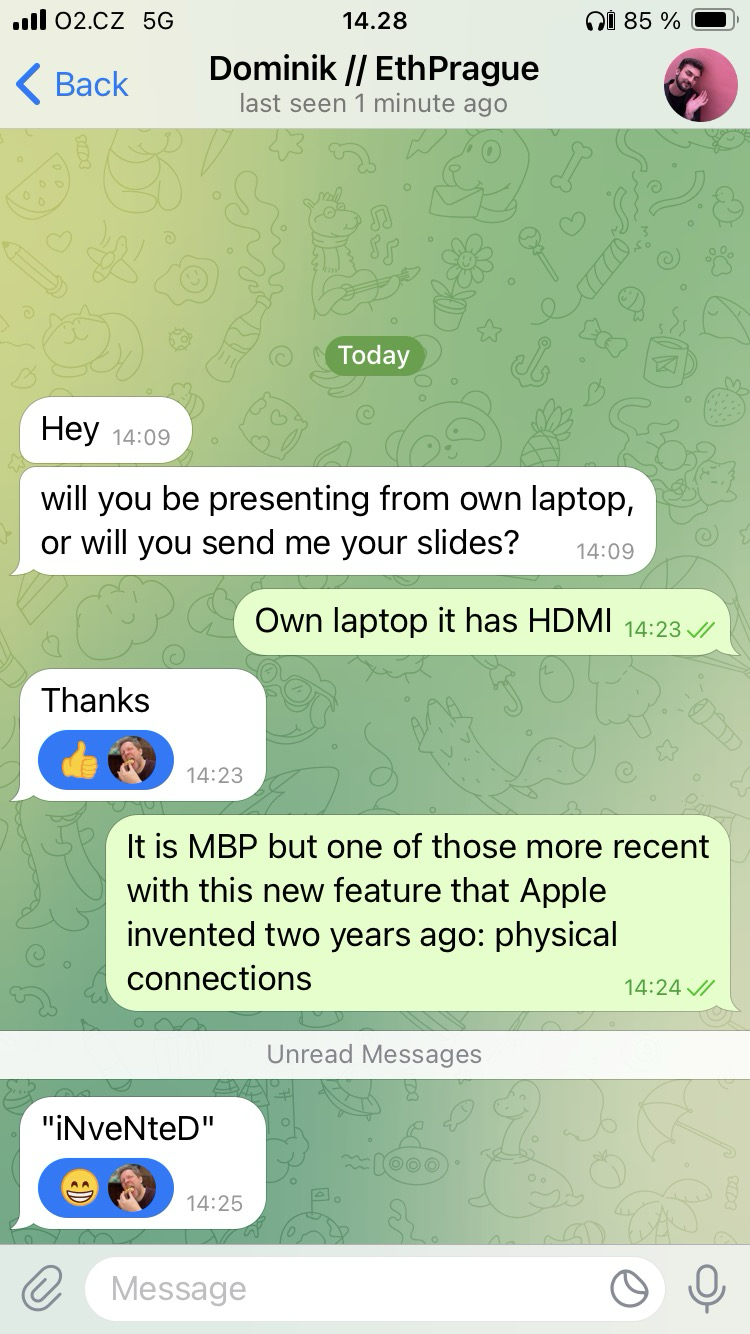Posts
5078Following
331Followers
504OpenPGP: 3AB05486C7752FE1
Jarkko Sakkinen
jarkkoOther thing that puzzles in #Ethereum and #Swarm is that why waste bandwidth and CPU cycles to #JSON when you could #ASN1 the transaction like:
Root ::= SEQUENCE {
from INTEGER
to INTEGER
value INTEGER
gas INTEGER
gasPrice INTEGER
nonce INTEGER
data OCTET STRING
chainId INTEGER
}
Pretty trivial scalability optimization IMHO. Maybe I submit another talk just to say that hey use ASN1.
Jarkko Sakkinen
jarkkoJarkko Sakkinen
jarkkoE.g. Microsoft has already efforts ongoing to enable Ethereum in Edge browser and they are also investing to TPM2 in Bitlocker. So I'd expect that this would be a no-brainer also for Microsoft. And it would be few lines of code to extend this to also manage Ethereum, Bitcoin and other similar rooted blockchains by the kernel keyring: https://lore.kernel.org/linux-crypto/20240528210823.28798-1-jarkko@kernel.org/T/#t
Jarkko Sakkinen
jarkkoJarkko Sakkinen
jarkkoAlso, here the cool part considering is really the ASN.1 compiler, which could take advantage of procedural macros to spit out snippet of that bytecode. Because it is part of kbuild shenanigans it could be enabled potentially earlier than actual Rust features in vmlinux.
Doing this might also be a way to find better guidelines on how to use Rust in kernel.
#linux #kernel #Rust #rustlang
Jarkko Sakkinen
jarkkoThen gccrs would need to be on par only on that subset to be enabled for kernel build, which is first and foremost important thing for defconfig.
I implemented first versions of WebGL support back in 2010 for QtWebKit, which then spread to GtkWebKit and EFLWebKit. From that background I know how nicely that project copes with C++ and its crazy features :-)
Jarkko Sakkinen
jarkkoJarkko Sakkinen
jarkkoJon Greig
jgreig@ioc.exchangeNIST said it has awarded a new contract to an outside vendor that will help the federal government process software and hardware bugs added to the National Vulnerability Database (NVD).
NIST wouldnt say which vendor was hired
https://therecord.media/nist-nvd-backlog-clear-end-fiscal-2024
Jarkko Sakkinen
jarkko@lorddimwit Nothing against Zig but we apparently chose Rust.
I still think we should fork Rust and strip it down like hell. Then it would not be compatible with Rust but more like relative. I don’t see any problem in that I mean even C is not at least formally a subset of C++, they have some differences in semantics
I don’t care about languages (except little bit of C which is lingua franca for ABI) but I’m more like worried:
- Experienced maintainers in file systems, mm etc. with no time at hands are not able to do proper analysis on Rust. So we are going to the unknown without “shared consensus” being on the steering wheel.
- It has tons of “never use this in kernel” crap, which we IMHO should just remove from it. Who care if we end up something NOT Rust but still relative or similar to Rust.
- Language spec is out of control… and in Github ;-)
- Compiler bugs are a disease. That huge ever growing language spec maintains their steady flow.
- It will be tedious job to maintain correspondence with gccrs and rustc. Even if you think that LLVM should be everywhere (which is no-go for linux but just for the sake of example), how do you do ever detect all those nasty compiler bugs?
We need something more compact that does not change often so that also compiler’s implementation can be matured, bugs fixed etc. So yeah, to sort out this madness I really do personally (this is my voice only, not korg as org) think that we should stop this madness and just do a fork and control all that in kernel mailing lists. Linux would deserve language of its own, relative to Rust but not always compatible…
Jarkko Sakkinen
jarkkoJarkko Sakkinen
jarkkoJarkko Sakkinen
jarkkoJarkko Sakkinen
jarkkoJarkko Sakkinen
jarkkoGithub makes following the language development with easy ways to backtrack years old discussons almost impossible or you really have to put effort to it vs. just going to lore and grabbing a mbox.gz of a relevant discussion.
I really wish I would live in this nice and lusty alternate reality instead of this crappy and rusty reality ;-)
